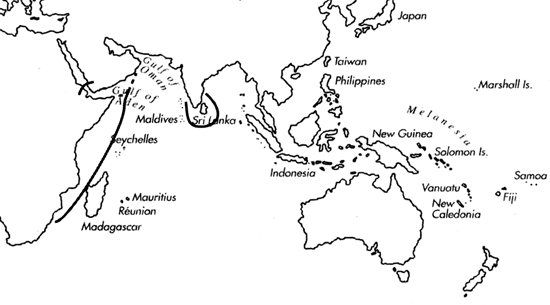Range: Natal to Somalia and S. Yemen; S. India (Gulf of Mannar) and Sri Lanka.
Description: Moderately small to medium-sized, moderately light to moderately solid. Last whorl generally pyriform, sometimes conical or ventricosely conical or broadly and ventricosely conical; outline convex adapically, straight to concave (right side) or concave (left side) below. Shoulder angulate, with many small tubercles; deep exhalent notch. Spire of moderate height to high, outline straight. Larval shell multispiral, maximum diameter about 1.05 mm. Postnuclear spire whorls closely tuberculate. Teleoconch sutural ramps slightly concave, with 0-2 increasing to 3-5 spiral grooves crossed by arcuate radial threads; grooves spirally striate and sometimes weak in latest whorls. Last whorl usually with strong, narrow or broad spiral ribbons from base to shoulder; grooves between rather broad, axially striate and often with an additional finer spiral rib. Spiral elevations crossed by distinct axial grooves, giving a costate or granulose appearance.
| Shell Morphometry | ||
|---|---|---|
| L | 27-50 mm | |
| RW | 0.09-0.27 g/mm | |
| RD | 0.62-0.80 | |
| PMD | 0.82-0.94 | |
| RSH | 0.17-0.28 | |
Ground colour white. Last whorl with spirally arranged dark or light brown blotches, dashes, and dots and axial streaks and blotches. Pattern elements fuse into 2-3 spiral bands, below shoulder, at centre and near base. Shells from Somalia (Pl. 55, Figs. 7, 8) may have only irregularly scattered small brown blotches. Larval whorls grey to beige. Postnuclear sutural ramps with brown radial blotches or weakly patterned with brown spots between tubercles.
Periostracum pale yellow, translucent.
Radular teeth hollow and constricted above centre, with an adapical barb, a basal spur and a vestigial membrane (Taylor, 1990 & 1991).
Habitat and Habits: In 100-400 m, on sand and mud.
Discussion: The combination of shape and sculpture in C. eucoronatus is so unique to the species as to set it apart from all congeners.

C. eucoronatus range map
This section contains verbatim reproductions of the accounts of 316 species of Conus from the Indo-Pacific region, from Manual of the Living Conidae, by Röckel, Korn and Kohn (1995). They are reproduced with the kind permission of the present publisher, Conchbooks.
All plates and figures referred to in the text are also in Röckel, Korn & Kohn, 1995. Manual of the Living Conidae Vol. 1: Indo-Pacific Region.
The range maps have been modified so that each species account has it own map, rather than one map that showed the ranges of several species in the original work. This was necessary because each species account is on a separate page on the website and not confined to the order of accounts in the book.